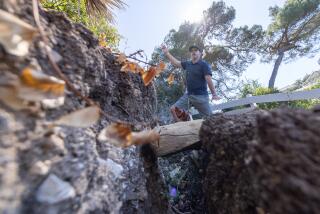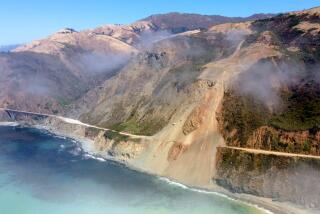Landslide forces Washington drivers on harrowing mountain detour

Mountain Loop Highway
- Share via
DARRINGTON, Wash. — Before the catastrophic landslide killed at least 24 people and severed the main highway out of town, it took about 30 minutes to drive from this mountain community west to Arlington.
Now that State Route 530 is blocked by debris up to 70 feet high — including mangled cars compacted to the size of small refrigerators — it can take three hours.
Aside from a lengthy northern detour, intrepid drivers can use Mountain Loop Highway, a harrowing, rutted road that saves an hour but can take at least that much time off your life.
In the landslide area, the disaster’s toll continued to mount. On Monday, officials raised the number of confirmed deaths to 24, located three additional bodies not on that list, and lowered the tally of the missing to 22.
Searchers kept digging through the slurry of toxic debris. Steve Harris, who has been supervising rescue and recovery efforts on the Darrington side of the landslide, said dogs were still searching for bodies. Some sites were marked with plywood signs or tree trunks spray-painted with a bright orange “PV” for “possible victim.” Dogs and searchers must be decontaminated before leaving the scene.
As for Darrington’s road troubles, officials suggested Mountain Loop Highway as a temporary solution last week.
The southern detour is usually closed in winter because of flooding. It has also been closed for windstorms, sometimes for years.
Built on a wagon trail in 1936, the “highway” is strung together from forest roads, paved and unpaved, that dip and swirl through remote, unlit and uninhabited stretches of Mt. Baker-Snoqualmie National Forest. At the foot of the Cascade Range, the forest is home to one of the country’s largest winter gatherings of bald eagles, ice caves and more glaciers than any other national forest outside Alaska.
There’s still snow here in late March, piled several feet high along the road. Signs warn drivers to use all-wheel drive and be prepared for hazardous conditions.
The first nine miles out of Darrington are paved, but then the blacktop gives way to 13 miles of gravel and mud, with no street lights or cellphone service and few spots to turn around. In some places, the two-lane road narrows to a single muddy lane with no shoulder. The speed limit is 25 mph, but there are few signs and even fewer people to enforce it.
Recent heavy rains have made the muddy passage even more slippery, a concern since the loop is mostly lined by massive, mossy fir trees, or drops off into deep wooded canyons, where the Sauk and Stillaguamish rivers roar.
Sometimes, it feels like a cross between Malibu Canyon and “The Hobbit.”
Unlike Malibu Canyon, however, there are no guardrails along many stretches of Mountain Loop.
Loggers in the area say the road doesn’t faze them. But even they hesitate to take it now.
Catharine and Larry Shaw of nearby Lake Stevens have ailing relatives in Darrington. They were so nervous about taking Mountain Loop that they passed up a landslide victim fundraiser Sunday to take a test drive.
They drove their Nissan Armada, a formidable SUV, or, as Catharine Shaw likes to call it, “a beast.”
That didn’t help.
“We will be driving out on concrete,” said Shaw, 49, as they stopped at an espresso stand in Darrington before taking the long way home — coincidentally, through a town called Concrete.
Sean Frick also drove the loop from Lake Stevens on Sunday with his wife and two daughters, ages 8 and 10. As the family’s Isuzu SUV bumped over potholes the size of hubcaps, the girls “were a little nervous,” he said.
His wife, Kiara Frick, was amazed to see a U-Haul van barreling toward them down a muddy slope. “That’s a little too fast for this road,” she said.
Makala Johanson, 20, has to drive 100 miles to the Everett area, where she’s attending community college. In the last four days, she said, she has spent more than $150 on gas. She doesn’t want to drive Mountain Loop, which she has braved only in summer and considers unsafe.
“I love this town,” said Johanson, who wore a neon green “Logger Strong” T-shirt that served as a fundraiser and a message of hope for slide survivors. “I grew up here. I won’t move.”
Her friend Chrysta Coleman, 20, works as a caregiver for the elderly. Now she has to leave home at 4 a.m.
“I have multiple clients, some who can’t walk, who count on me to be there to get their food and medications,” Coleman said. “It’s difficult.”
Johanson bought $20 worth of gas, all she could afford. Then she said goodbye to Coleman and headed for her own car, shouting, “Drive safe!”
More to Read
Sign up for Essential California
The most important California stories and recommendations in your inbox every morning.
You may occasionally receive promotional content from the Los Angeles Times.











